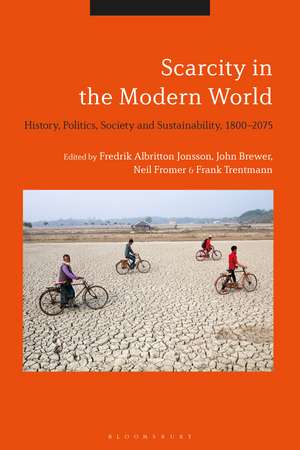Scarcity in the Modern World: History, Politics, Society and Sustainability, 1800-2075
Editat de John Brewer, Neil Fromer, Fredrik Albritton Jonsson, Professor Frank Trentmannen Limba Engleză Paperback – 19 aug 2020
| Toate formatele și edițiile | Preț | Express |
|---|---|---|
| Paperback (1) | 226.04 lei 6-8 săpt. | |
| Bloomsbury Publishing – 19 aug 2020 | 226.04 lei 6-8 săpt. | |
| Hardback (1) | 658.11 lei 6-8 săpt. | |
| Bloomsbury Publishing – 20 feb 2019 | 658.11 lei 6-8 săpt. |
Preț: 226.04 lei
Preț vechi: 289.56 lei
-22% Nou
Puncte Express: 339
Preț estimativ în valută:
43.25€ • 45.16$ • 35.72£
43.25€ • 45.16$ • 35.72£
Carte tipărită la comandă
Livrare economică 16-30 aprilie
Preluare comenzi: 021 569.72.76
Specificații
ISBN-13: 9781350178267
ISBN-10: 1350178268
Pagini: 312
Dimensiuni: 156 x 234 x 21 mm
Greutate: 0.44 kg
Editura: Bloomsbury Publishing
Colecția Bloomsbury Academic
Locul publicării:London, United Kingdom
ISBN-10: 1350178268
Pagini: 312
Dimensiuni: 156 x 234 x 21 mm
Greutate: 0.44 kg
Editura: Bloomsbury Publishing
Colecția Bloomsbury Academic
Locul publicării:London, United Kingdom
Caracteristici
Relates historical concerns about scarcity to modern scientific forecasts and discussions surrounding climate change and their future implications upon the planet
Notă biografică
John Brewer is Eli and Edye Broad Professor in Humanities and Social Sciences at the California Institute of Technology, USA.Neil Fromer is the Executive Director of the Resnick Institute at the California Institute of Technology, USA.Fredrik Albritton Jonsson is Associate Professor of British History, Conceptual and Historical Studies of Science at the University of Chicago, USA.Frank Trentmann is Professor of History at Birkbeck College, University of London, UK.
Cuprins
List of IllustrationsNotes on Contributors1. Introduction, Fredrik Albritton Jonsson, John Brewer, Neil Fromer and Frank TrentmannPart 1 Making Scarcity2. Scarcity: Language and Politics, Jean-Laurent Rosenthal3. Untangling Scarcity, Amber Huff and Lyla Mehta4. Rethinking the Relationships between Scarcity, Poverty and Hunger: An Anthropological Perspective, Richard Wilk5. Renewable Energy: A Story of Abundance and Scarcity, Neil FromerPart 2 The Power of Projection6. Growth in the Anthropocene, Fredrik Albritton Jonsson7. The Great Resources Myth, David Rutledge8. Escapology, or How to Escape Malthusian Traps, Jörg FriedrichsPart 3 Coping, Managing, Innovating at Different Scales9. U.S. Mobilization during the Second World War as a Model for Coping with Climate Change, Hugh Rockoff10. Scarcity and Innovation: Lessons from the British Economy during the U.S. Civil War, W. Walker Hanlon11. China's Great Leap Famine: Malthus, Marx, Mao and Material Scarcity, Sigrid Schmalzer12. Encounters with Scarcity at a Micro-Scale: Householders' Responses to Drought as a Continuum of Normal Practice, Heather ChappellsPart 4 Dynamics of Distribution13. A Climate of Scarcity: Electricity in India, 1899-2016, Elizabeth Chatterjee14. Lagos 'Scarce-City': Investigating the Roots of Urban Modernity in a Colonial Capital, 1900-1928, David Lamoureux15. Energy Shortages and the Politics of Time: Resilience, Redistribution and 'Normality' in Japan and East Germany, 1940s-1970s, Hiroki Shin and Frank Trentmann16. Food Shortages: The Role and Limitations of Markets in Resolving Food Crises during the 2012 Famine in the Sahel, Emma C. StephensAcknowledgementsIndex
Recenzii
Scarcity is no longer just an axiom that governs the narrow world of modern economics; Scarcity in the Modern World reveals a socially, politically, and economically constructed condition in constant tension with the biophysical world. As the mantra of infinite growth in a finite world governs modern capitalism, scarcity threatens to have profound, if not devastating, effects on human life. Spanning cultures, continents, and academic disciplines, this timely anthology richly historicizes climate change and resource exhaustion, as well as proposes creative ways to conceptualize future solutions. This book serves as model for how interdisciplinary scholarship can productively address critical challenges facing humanity.
